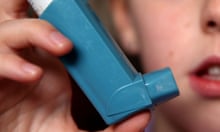Women with asthma are twice as likely to die from an asthma attack compared with men in the UK, new figures show as health experts called for urgent research into the condition’s sex-related differences.
They are more likely to have the condition, more likely to need hospital treatment for it and more likely to die from an attack, Asthma + Lung UK said. Over the past five years women have accounted for more than two-thirds of asthma deaths in the UK.
The charity said the current “one size fits all” approach to asthma treatment is “not working” because it does not take into account the impact that female sex hormones during puberty, periods, pregnancy and menopause can have on asthma symptoms and attacks. More must be done to tackle the “stark health inequality”, it added.
In childhood, asthma is more prevalent and severe in boys. However, after puberty the situation completely reverses, Asthma + Lung UK said.
Between 2014-15 and 2019-20 more than 5,100 women in the UK died from an asthma attack compared with fewer than 2,300 men. Meanwhile, emergency hospital admissions in England show that, among those aged 20 to 49, women were 2.5 times more likely to be admitted to hospital for asthma treatment compared with men.
Asthma + Lung UK said many people were unaware that fluctuations in female sex hormones can cause asthma symptoms to flare up or even trigger life-threatening attacks. It is calling for more research to examine the sex-related differences in asthma.
Poppy Hadkinson, 30, a TV presenter from Stratford-upon-Avon, said her asthma worsened when she went through puberty. “I was diagnosed with asthma aged 11, which looking back on it was when I was right in the middle of going through puberty,” she said. “Over the next decade, I had regular asthma attacks and would end up in hospital up to six times a year.
“There seemed to be a pattern to my symptoms, linked to my menstrual cycle. Nearly every month in the run up to my period, I’d be really ill with my asthma. My symptoms would leave me struggling to breathe, which was terrifying, and I’d often end up in hospital.
“The asthma attacks I suffered were so severe that I’d been ventilated four times by the time I was 22 and was questioning whether I’d make it to my next birthday.” She later began using a biologic drug, omalizumab, which has been a “life-changer”.
“We need to better understand how asthma affects women so we can find treatments that will give women like me their lives back,” she said.
Asthma + Lung UK is encouraging GPs to explore potential triggers with their patients and create tailored adjustments to a patient’s medication regimen. Women are also being encouraged to take their preventer medication as prescribed, ensure they attend their annual asthma review, and to keep a symptom diary that could help identify triggers.
The Asthma + Lung UK chief executive, Sarah Woolnough, said: “When it comes to research funding, women with asthma have drawn the short straw. Gaps in our knowledge are failing women, leaving them struggling with debilitating asthma symptoms, stuck in a cycle of being in and out of hospital and, in some cases, losing their lives.
“By understanding the role of sex hormones in asthma, we could transform the lives of the 3 million women with the condition in the UK and the many millions of women with asthma across the world. We urgently need to see more investment in research in this area so we can find new treatments and better use existing treatments to help millions of women and save lives.”









